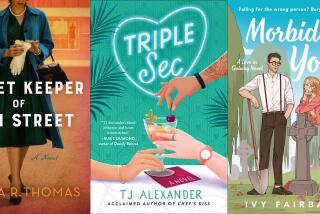Fiction Shelf: ‘The Virgins,’ ‘Hypothetical Girl’ and ‘Loteria’
- Share via
The Virgins
A Novel
Pamela Erens
Tin House: 288 pp., $15.95 paper
It’s rare to find a book that summons the delicate emotional state of teenagers — especially when it comes to sex — without being precious or cynical, but Pamela Erens’ “The Virgins” beautifully manages that feat.
“It sounds laughably dramatic, but don’t underestimate the metaphysical yearnings of a seventeen-year-old,” the book’s preppy narrator reminds us. “We beginners experienced sex as psyche more than body, as vulnerability and power, exposure and flight, being consumed, saved, transfigured.” Indeed, Bruce Bennett-Jones continues, it can be “the death of one’s ideal soul” when it’s done wrong.
Such is the fate for Aviva Rossner and Seung Jung, two ethnic outsiders (she’s Jewish; he’s Korean American) at the whitewashed Auburn Academy boarding school in 1979. The world hardly needs another elite prep school novel, but this one rises to the occasion, line by lovely line.
Bennett-Jones, telling the story of Aviva and Seung from the vantage of adulthood, stays on the sidelines for most of their relationship, alternately admiring their connection and fuming with jealousy, but such distance doesn’t stop him from coloring in the blanks of the couple’s most intimate moments, and feelings. At times, he’s so gripped by his narrative duties that he disappears completely, only to reemerge in another chapter with gripes about his stern judge father and alcoholic mother (who both verge on clichés out of the Long Island Lockjaw handbook but are nevertheless rendered acutely). Bennett-Jones’ slippery role calls into question how stories are told, who controls them and how much we all fill in the blanks when left to our own devices.
Erens has created a moody yet romantic set piece in which every gesture is loaded with meaning, every touch infused with potential ecstasy or calamity. The ending is not totally satisfying in terms of access to Aviva’s state of mind, but it isn’t afraid to plumb a dark kind of grace.
The Hypothetical Girl
A Novel
Elizabeth Cohen
Other Press: 256 pp., $14.95 paper
The only thing sillier than the names of real online dating sites are the ones made up by Elizabeth Cohen in her affable short story collection, “The Hypothetical Girl.” Across 15 snapshots, nearly all from the trenches of Internet dating, we encounter catch.com, doctorlove, letsgethooked, flirtypants, seriouslylooking and the icky yummybaby.com, where one character goes to “slum it.”
For anyone who’s spent time searching for love online, Cohen’s depiction of the rush from digital flirting, followed by the premature projection of fantasies onto some stranger’s strategically cropped photo, finally dashed on the first date where you realize he’s seven inches shorter than he stated on his profile and that’s only one of the lies, is all too accurate. Cohen, a Plattsburgh State University professor in upstate New York, captures all the states of the flirt-fantasy-epic fail cycle with deftness but it doesn’t dig all that deep. Too often these stories land like a glancing blow and not the knockout punch.
Loteria
Mario Alberto Zambrano
Harper Collins: 288 pp., $21.95
Loteria, as this sly debut novel explains at the start, is “often described as Mexican bingo, a game of chance.” It doesn’t rely on numbers, however; it’s based on illustrated images from a deck of 54 cards. Author Mario Alberto Zambrano, a former professional ballet dancer, cleverly utilizes these images as memory prompts for his feisty protagonist, Luz Maria Castillo, an 11-year-old girl living in a group home with little more than a Loteria pack to call her own.
Struggling to make sense of a violent episode in her family that left her sister Estrella gravely injured and her Papi in jail, Luz stonewalls the counselors in favor of pulling cards and writing what they trigger in her journal. Each card illustration (“el arpa” for harp; “la escalera” for ladder) starts a new chapter, most of them only four to five pages long.
Pieces of the puzzle emerge but Luz doesn’t make it easy to put together. A champion of her family’s toxic logic, she rationalizes their abusive behavior to a fault, her loyalty both endearing and tragic. Sometimes what Zambrano leaves off the page is just as important as what’s been written. This narrative sleight of hand shows Zambrano’s gift for evoking great pain in stark, lyrical sketches.
More to Read
Sign up for our Book Club newsletter
Get the latest news, events and more from the Los Angeles Times Book Club, and help us get L.A. reading and talking.
You may occasionally receive promotional content from the Los Angeles Times.










